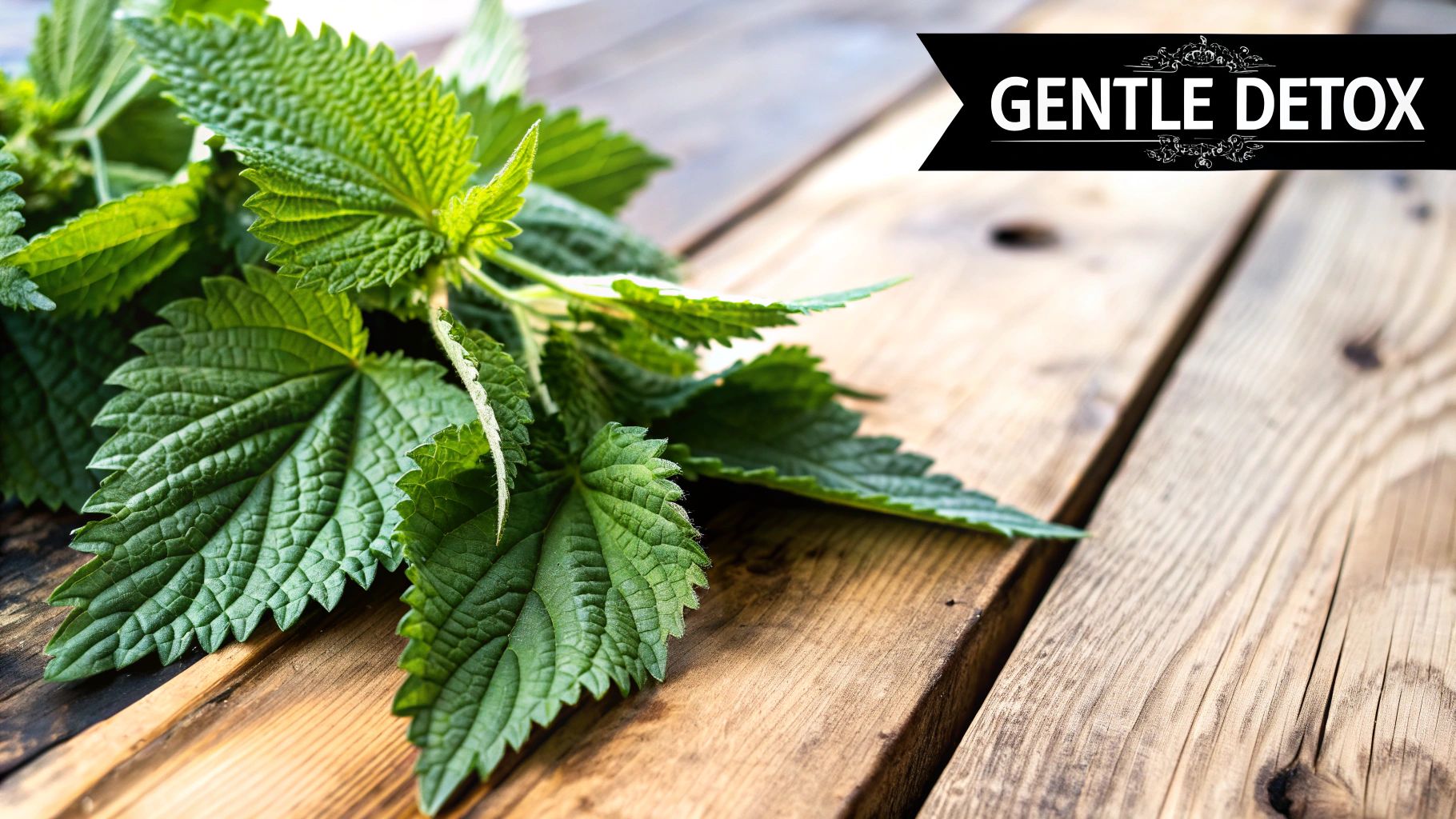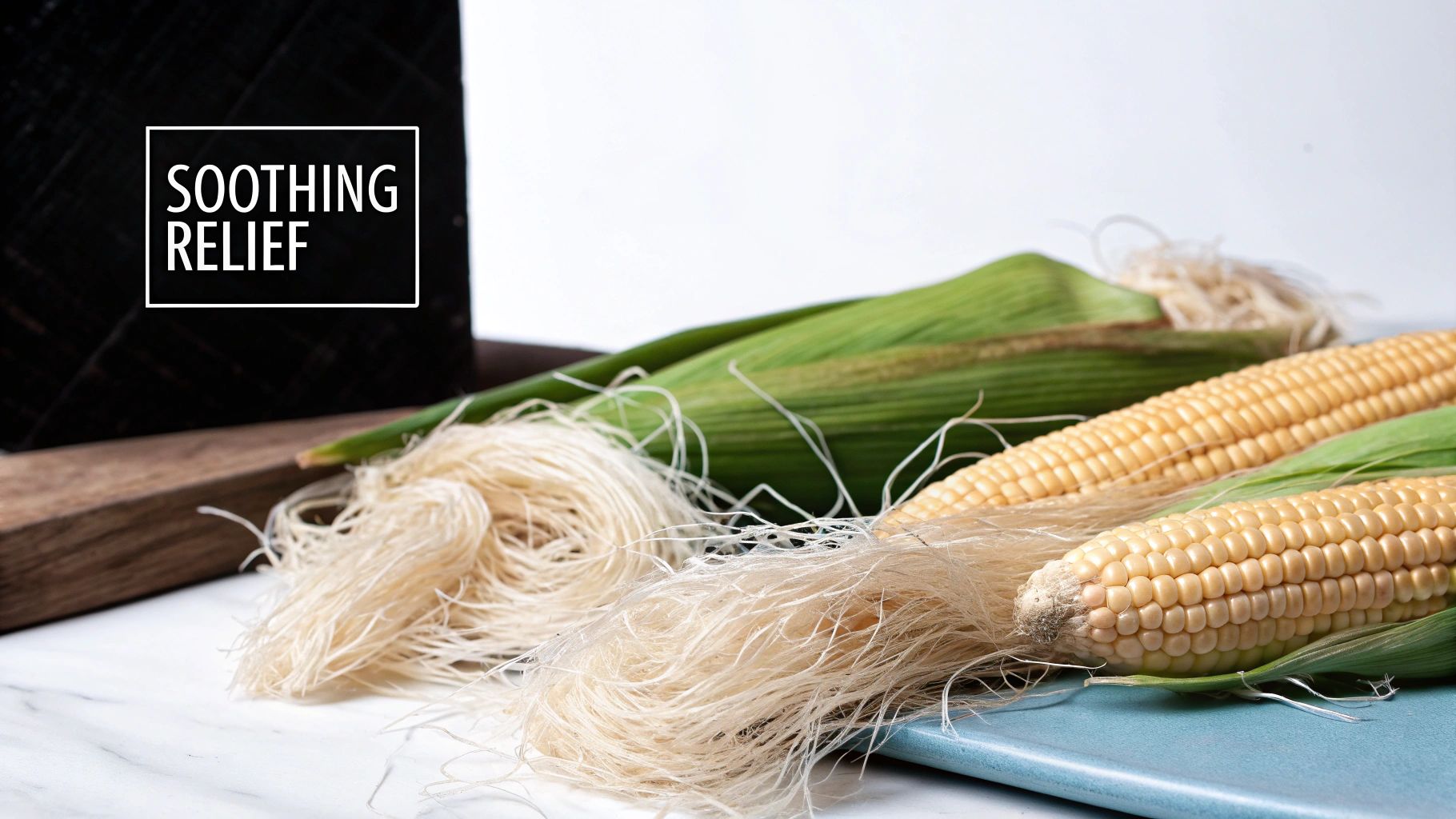The kidneys, a pair of bean-shaped organs, serve as the body's sophisticated filtration system, tirelessly working to remove waste, balance electrolytes, and regulate blood pressure. Supporting their function is paramount to overall health and vitality. While conventional medicine offers critical interventions for kidney disease, many individuals seek complementary, natural approaches to maintain and enhance renal wellness. This is where the ancient wisdom of herbal medicine provides a valuable toolkit.
For centuries, traditional healing systems have identified specific botanicals that support the urinary system and promote kidney detoxification. These herbs work through various mechanisms, such as increasing urine flow to flush out toxins, reducing inflammation that can damage delicate kidney tissues, and providing antioxidant protection against cellular stress. Integrating these natural allies into a holistic health plan can offer a gentle yet effective way to support your body's essential filtration processes.
This comprehensive guide is designed to explore the best herbs for kidney health, moving beyond surface-level recommendations. We will provide an in-depth profile for each selected herb, including Nettle Leaf, Dandelion, Cranberry, Corn Silk, Juniper Berries, and Uva Ursi. You will learn about their specific benefits for the kidneys, traditional applications, and most importantly, practical guidance on how to use them safely and effectively. We will cover recommended dosages, preparation methods like teas and tinctures, and crucial safety considerations to ensure you are making informed decisions for your well-being. This article will equip you with the actionable knowledge needed to harness nature’s support for optimal kidney function.
1. Nettle Leaf (Urtica dioica)
Often dismissed as a common weed, Nettle Leaf (Urtica dioica) is a nutritional powerhouse and one of the most revered herbs for kidney health in traditional herbalism. Its primary action is as a gentle but effective diuretic, which means it helps increase the flow of urine. This process is crucial for kidney function, as it facilitates the flushing of metabolic waste, excess salts, and toxins from the body.
Unlike synthetic diuretics that can deplete the body of essential electrolytes, Nettle is remarkably nutrient-dense. It provides a rich source of vitamins (A, C, K, and several B vitamins) and minerals, including iron, calcium, and potassium. This mineral profile helps replenish the body, making Nettle a supportive and nourishing tonic for the entire urinary system. By promoting healthy fluid dynamics, it helps reduce the burden on the kidneys and may prevent the buildup that can lead to irritation or the formation of kidney stones.

Historical Use and Modern Validation
Nettle's role in supporting the kidneys is well-documented throughout history. Traditional European herbalism has long employed it for conditions like urinary tract infections (UTIs), bladder irritation, and to help prevent and dissolve kidney stones. Its use is also prominent in Ayurvedic medicine for managing a range of urinary disorders.
This traditional wisdom is supported by modern authorities. The German Commission E, a highly respected scientific advisory board, has approved Nettle leaf for use in addressing inflammatory conditions of the lower urinary tract and for the prevention of kidney stones. Its anti-inflammatory properties may also help soothe irritated tissues within the urinary system, providing comprehensive support.
How to Use Nettle Leaf for Kidney Support
Incorporating Nettle Leaf into your routine is straightforward. It is most commonly consumed as a tea or infusion, but it's also available in tincture and capsule form.
- Nettle Tea: Steep 1-2 teaspoons of dried Nettle leaf in one cup of hot water for 10-15 minutes. Covering the mug while it steeps helps retain the volatile oils. Start with one cup per day to assess your body's response.
- Dosage: For tinctures or capsules, follow the dosage instructions provided on the product label, as concentrations can vary.
- Safety First: It is always best to start with a small dose to ensure you don't have any adverse reactions. Since it is a potent diuretic, ensure you maintain adequate hydration throughout the day. Fresh Nettle plants have stinging hairs, so it is recommended to use the dried leaf for internal consumption to avoid irritation.
Nettle’s benefits extend beyond the kidneys; its high nutrient content and anti-inflammatory action also make it a valuable herb for overall wellness. To learn more about how herbs like Nettle Leaf can strengthen your body's defenses, explore these additional insights on herbs for immune support. For those seeking to naturally bolster their renal system, Nettle Leaf offers a gentle, time-tested, and nutrient-rich approach.
2. Dandelion Root and Leaf (Taraxacum officinale)
Commonly seen as a persistent garden weed, Dandelion (Taraxacum officinale) is, in reality, one of the most effective and well-researched herbs for kidney health. Both the root and leaf offer distinct yet complementary benefits, functioning as a powerful kidney tonic and a gentle diuretic. Its primary role is to stimulate urine production, which helps the kidneys efficiently filter and excrete waste products, excess fluid, and accumulated toxins from the bloodstream.
A key advantage of Dandelion over conventional diuretics is its rich potassium content. While many pharmaceuticals flush out this vital electrolyte along with water, Dandelion naturally replenishes it, preventing the potential imbalances that can affect heart and muscle function. This unique profile makes it a safer and more nourishing option for long-term kidney support and detoxification. The leaf is particularly noted for its diuretic action, while the root is traditionally used for deeper cleansing of both the kidneys and liver.

Historical Use and Modern Validation
Dandelion's use as a kidney remedy is deeply rooted in global healing traditions. It has been a staple in Traditional Chinese Medicine for over a thousand years, valued for its ability to clear heat and resolve fluid retention. In European folk medicine, its diuretic properties are so well-known that its French name, pissenlit, literally translates to "wet the bed."
Modern research has begun to validate these long-held beliefs. Clinical studies have demonstrated Dandelion's diuretic effect, with one notable study showing a significant increase in urination frequency in participants after consuming a Dandelion leaf extract. Esteemed integrative medicine physicians like Dr. Andrew Weil also recognize its value in supporting renal and hepatic function. Furthermore, its anti-inflammatory properties contribute to overall urinary tract health. You can explore these additional insights on how to reduce inflammation to better understand how herbs can support your body's systems.
How to Use Dandelion for Kidney Support
Dandelion can be easily incorporated into a daily wellness regimen through teas, tinctures, or capsules. The choice between root and leaf depends on your specific health goals.
- Dandelion Tea: For a gentle diuretic effect, use the leaves. Steep 1-2 teaspoons of dried Dandelion leaf in a cup of hot water for 10 minutes. For a deeper kidney and liver cleanse, use the root. Simmer 1-2 teaspoons of dried, roasted Dandelion root in a cup of water for 15 minutes.
- Dosage: When using tinctures or capsules, always adhere to the manufacturer's recommended dosage on the product label. It is often beneficial to take Dandelion with food to minimize any potential for stomach irritation.
- Safety First: Because Dandelion is a potent diuretic, it is crucial to drink plenty of water throughout the day to stay hydrated and support the kidneys' flushing action. If you forage for your own, harvest young leaves in the spring before the plant flowers for the best flavor and potency.
3. Cranberry (Vaccinium macrocarpon)
Widely recognized for its role in urinary tract health, Cranberry (Vaccinium macrocarpon) is a powerful and scientifically validated fruit for supporting the kidneys. Its primary benefit stems from a unique class of compounds called A-type proanthocyanidins (PACs). These PACs possess an anti-adhesion property, meaning they prevent harmful bacteria, particularly E. coli, from sticking to the walls of the bladder and urinary tract. This action is critical for kidney health, as it helps prevent infections from ascending into the kidneys, a condition known as pyelonephritis.
By inhibiting bacterial colonization, cranberry significantly reduces the risk of recurrent urinary tract infections (UTIs), which are a major source of stress on the renal system. Chronic or frequent UTIs can lead to inflammation and potential kidney damage over time. Cranberry’s ability to maintain a healthier urinary environment makes it an indispensable herb for anyone looking to proactively protect their kidney function and is considered one of the best herbs for kidney health.
Historical Use and Modern Validation
The use of cranberry dates back centuries, with Native American tribes employing it not only as food but also as a medicinal agent for bladder and kidney ailments. This traditional wisdom has since been overwhelmingly validated by modern science. Urologists worldwide now routinely recommend cranberry for patients with recurrent UTIs, and even NASA has utilized it to support astronaut urinary health during space missions.
Numerous clinical studies have confirmed its efficacy. A landmark Cochrane Review, which analyzed 24 different studies, concluded that cranberry products can significantly reduce the incidence of UTIs, particularly in women with recurrent infections. This body of evidence solidifies cranberry’s position from a folk remedy to a mainstream, evidence-based supplement for urinary and kidney wellness.
The infographic below summarizes the key data points that make cranberry a powerful choice for kidney support.

These key takeaways highlight the importance of choosing a standardized supplement to ensure you receive the clinically effective dose of PACs for optimal UTI prevention and kidney protection.
How to Use Cranberry for Kidney Support
To achieve therapeutic benefits, it is crucial to select the right form and dosage of cranberry. Many commercial cranberry juices are high in sugar, which can counteract the health benefits.
- Choose the Right Product: Opt for unsweetened 100% cranberry juice, concentrated cranberry tablets, or capsules. Avoid "cranberry cocktails," which are mostly sugar and water.
- Dosage: For supplements, look for products standardized to provide at least 36 mg of proanthocyanidins (PACs) per serving, which is the clinically studied dose for UTI prevention. Follow the manufacturer's instructions for daily intake.
- Stay Hydrated: Always consume cranberry products with a full glass of water. This enhances its anti-adhesion effects and helps flush the urinary system, further supporting kidney function.
- Safety First: Cranberry is generally safe for most people. However, those with a history of oxalate kidney stones should consult a healthcare provider before using concentrated cranberry supplements, as they can increase oxalate levels in the urine.
Cranberry's proven ability to prevent bacterial adhesion in the urinary tract makes it a cornerstone of natural kidney care. For those seeking to deepen their understanding of how holistic approaches can manage complex conditions, you can find more information on integrative strategies for chronic pain and wellness. By incorporating high-quality cranberry products into your routine, you can take an effective, proactive step toward safeguarding your long-term kidney health.
4. Corn Silk (Zea mays)
Often discarded during food preparation, Corn Silk (Zea mays) refers to the long, silky threads found inside the husk of a fresh ear of corn. This seemingly humble material is a highly valued traditional remedy for urinary and kidney ailments. Its primary benefit lies in its gentle diuretic and demulcent properties. As a diuretic, it increases urine output, helping to flush the kidneys of excess minerals and waste products that could otherwise contribute to kidney stone formation.
Simultaneously, its demulcent action helps to soothe and coat the delicate tissues of the urinary tract, reducing inflammation and irritation. This dual action makes Corn Silk a particularly supportive herb for conditions like urinary tract infections (UTIs), cystitis, and prostatitis. It provides a soothing effect while actively helping the body cleanse the urinary system, making it one of the best herbs for kidney health, especially where irritation is a primary concern.

Historical Use and Modern Validation
The use of Corn Silk for urinary support is widespread across many cultures. Native American herbalism traditions have long employed it to address a variety of urinary disorders and kidney-related issues. In Traditional Chinese Medicine (TCM), it is known as 'Yu Mi Xu' and is used to clear damp-heat, promote urination, and reduce edema (swelling). Its use is also well-documented in Appalachian and Latin American folk medicine as a primary remedy for dissolving and preventing kidney stones.
Modern research is beginning to validate these traditional uses. Studies have shown that Corn Silk contains compounds like flavonoids, saponins, and potassium salts that contribute to its diuretic and anti-inflammatory effects. Its high potassium content is particularly noteworthy, as it helps offset the potential loss of this vital mineral that can occur with other diuretics, ensuring a more balanced and nourishing action on the body.
How to Use Corn Silk for Kidney Support
Corn Silk is most effective when consumed as a fresh tea or infusion, although it is also available in dried form, as well as in tinctures and capsules.
- Corn Silk Tea: Steep 2-3 teaspoons of fresh or dried Corn Silk in a cup of hot water for 10-15 minutes. For maximum potency, harvest the silk from fresh, organic corn during peak season. Strain the threads before drinking. It has a mild, slightly sweet flavor.
- Dosage: When using tinctures or capsules, always adhere to the manufacturer's recommended dosage on the product label.
- Safety First: Corn Silk is generally considered very safe, but its diuretic nature means you should drink plenty of water to stay hydrated. Those with corn allergies should avoid it. As with any herbal supplement, it is wise to consult with a healthcare professional before starting, especially if you are pregnant, nursing, or have a pre-existing medical condition.
Combining Corn Silk with other kidney-supportive herbs like Nettle Leaf can create a powerful synergistic blend for comprehensive urinary tract health. Its gentle nature makes it an excellent introductory herb for those looking to support their renal system naturally.
5. Juniper Berries (Juniperus communis)
Juniper Berries (Juniperus communis) are recognized as one of the most powerful cleansing herbs for kidney health, possessing potent diuretic and antiseptic qualities. These small, deep-blue berries contain volatile oils, most notably terpinene-4-ol, which stimulates kidney filtration. This action increases urine flow, helping to effectively flush out metabolic waste, uric acid, and other toxins that can accumulate in the renal system.
Beyond their diuretic effect, Juniper berries have strong antiseptic properties that make them particularly valuable for urinary tract health. They help to create an environment hostile to bacteria, making them a traditional choice for addressing infections like cystitis and urethritis. By both cleansing the system and fighting off harmful microbes, Juniper provides a comprehensive, though intense, form of support for the kidneys and the entire urinary tract.
Historical Use and Modern Validation
Juniper has a rich history of use in both European and Native American herbal medicine. Traditional European herbalists, including Benedictine monks in monasteries, utilized juniper berries in cleansing protocols for urinary disorders and to prevent fluid retention. In Native American traditions, juniper was often burned in purification ceremonies and used internally to support kidney function and address urinary complaints.
Modern understanding of Juniper's constituents validates its traditional application. The volatile oils are confirmed to be renal irritants in a therapeutic sense, meaning they directly stimulate the kidney's nephrons to increase their filtering rate. This direct action is why Juniper is considered so effective, but also why it must be used with caution and respect. Its powerful nature makes it a valuable tool for short-term detoxification rather than long-term daily use.
How to Use Juniper Berries for Kidney Support
Due to its potency, Juniper should be used carefully and typically for short durations. It is available as whole dried berries, a tea, a tincture, or in capsule form.
- Juniper Tea: Gently crush 1 teaspoon of dried juniper berries to release the volatile oils and steep in one cup of hot water for 10-20 minutes. Due to its strong flavor, it is often blended with milder herbs. Start with a small amount to assess tolerance.
- Dosage: When using tinctures or capsules, adhere strictly to the dosage instructions on the product label. It is often recommended to start with the lowest possible dose, such as chewing 3-5 berries, to see how your body responds.
- Safety First: Juniper is not recommended for long-term use (maximum of 2-6 weeks). It should be avoided by individuals with pre-existing kidney disease (nephritis) and during pregnancy. Always drink plenty of water when using juniper to support the flushing process and prevent over-concentration of its compounds in the kidneys. Take breaks between cleansing periods.
Juniper’s ability to promote healthy fluid balance can also be relevant for cardiovascular health, as managing fluid levels is connected to blood pressure regulation. For more on natural approaches to cardiovascular wellness, you can explore these herbs for managing high blood pressure. For those seeking a powerful, short-term cleanse for the renal system, Juniper Berries offer a time-honored and potent solution when used correctly.
6. Uva Ursi (Arctostaphylos uva-ursi)
Uva Ursi (Arctostaphylos uva-ursi), commonly known as bearberry, is a low-growing evergreen shrub recognized for its powerful, targeted action on the urinary system. It is one of the most respected herbs for kidney health, specifically valued for its potent antimicrobial properties. Its primary benefit lies in its ability to combat bacterial infections within the urinary tract, including the bladder and kidneys, which helps prevent infections from ascending and causing more serious kidney complications like pyelonephritis.
The key to Uva Ursi's effectiveness is its active compound, arbutin. After ingestion, arbutin travels through the body and is metabolized, eventually reaching the urinary tract. There, in an alkaline environment, it converts into hydroquinone, a substance with strong antiseptic and antibacterial capabilities. This conversion happens directly within the urinary system, allowing it to neutralize harmful bacteria like E. coli, the most common cause of urinary tract infections (UTIs). By directly addressing the source of infection, Uva Ursi helps protect the kidneys from damage and inflammation.
Historical Use and Modern Validation
Uva Ursi has a long and established history in traditional medicine across the globe, from Native American healing practices to Scandinavian folk medicine, where it was a primary remedy for urinary ailments for centuries. Its reputation as a urinary antiseptic is not just based on historical anecdotes; it is strongly backed by modern scientific review.
Both the German Commission E and the European Medicines Agency (EMA) have approved the use of Uva Ursi leaf for treating symptoms of mild, recurrent lower urinary tract infections. This official recognition underscores its efficacy and places it among the best herbs for kidney health when dealing with bacterial challenges. Clinical studies have further validated its use, with some research indicating that prophylactic use of Uva Ursi can significantly reduce the recurrence of UTIs, thereby protecting kidney function over the long term.
How to Use Uva Ursi for Kidney Support
Due to its potent nature, Uva Ursi requires careful and specific usage. It is typically found in capsule, tincture, or dried leaf form for tea.
- Uva Ursi Tea: Steep 1-2 grams of dried Uva Ursi leaf in a cup of hot water for 10-15 minutes. Its taste can be quite astringent.
- Enhancing Efficacy: To maximize the conversion of arbutin to hydroquinone, it is crucial to maintain alkaline urine. This can be achieved by taking a small amount of sodium bicarbonate (baking soda) or focusing on an alkaline diet rich in vegetables while avoiding acidic foods and drinks like citrus, tomatoes, and coffee.
- Dosage and Duration: For capsules or tinctures, adhere strictly to the manufacturer's recommended dosage. Uva Ursi is intended for short-term use only, typically for no longer than 1-2 weeks at a time, with extended breaks between treatments.
- Safety First: Uva Ursi should be taken with food to minimize potential stomach irritation. It is not recommended for pregnant or breastfeeding women, children, or individuals with pre-existing kidney disease without consulting a healthcare professional.
Uva Ursi offers a powerful, evidence-based approach to managing urinary tract infections and protecting the kidneys from bacterial harm. For more information on using targeted herbal remedies for specific conditions like UTIs, you can find valuable resources exploring natural solutions for UTIs.
Top 6 Kidney Health Herbs Comparison
| Herb | Implementation Complexity 🔄 | Resource Requirements ⚡ | Expected Outcomes 📊 | Ideal Use Cases 💡 | Key Advantages ⭐ |
|---|---|---|---|---|---|
| Nettle Leaf (Urtica dioica) | Moderate – requires drying/preparation to avoid irritation | Low – dried leaf or tea | Gentle diuretic, anti-inflammatory, nutritional support | Kidney support, fluid retention, urinary health | Nutrient-rich, safe long-term, supports blood pressure |
| Dandelion Root and Leaf (Taraxacum officinale) | Moderate – root tinctures and leaf teas available | Low – easy to harvest and prepare | Potassium-sparing diuretic, liver and kidney tonic | Kidney detox, fluid balance, elderly care | Widely researched, potassium-sparing, cost-effective |
| Cranberry (Vaccinium macrocarpon) | Low – mostly juice or standardized supplements | Moderate – suitable high-PAC standardized products | Prevents UTI recurrence, antibacterial, antioxidant | Recurrent UTI prevention, immune support | Clinically proven UTI prevention, well tolerated |
| Corn Silk (Zea mays) | Low – use fresh or dried for tea | Low – seasonal availability | Mild diuretic and anti-inflammatory, soothing urinary tract | Kidney stones, urinary tract soothing | Gentle and safe, suitable for all ages |
| Juniper Berries (Juniperus communis) | High – careful dosing, limited duration use required | Moderate – berries or tinctures | Strong diuretic and antibacterial, fast acting | Short-term kidney detox, acute UTI | Potent cleansing, antibacterial, fast effectiveness |
| Uva Ursi (Arctostaphylos uva-ursi) | High – requires pH management and limited duration use | Moderate – standardized extracts recommended | Strong antimicrobial, prevents recurrent UTIs | UTI treatment and prevention | Clinically validated UTI treatment, targeted action |
Integrating Herbal Wisdom into Your Kidney Care Routine
Navigating the world of herbal medicine can feel like learning a new language, but as we've explored, nature offers a rich vocabulary for supporting kidney function. This article has detailed some of the best herbs for kidney health, from the gentle diuretic action of Dandelion and Corn Silk to the powerful urinary antiseptic properties of Uva Ursi and Juniper. We have seen how Nettle Leaf offers deep nourishment and how Cranberry provides a formidable defense against urinary tract infections that can otherwise compromise kidney wellness.
The central theme connecting these powerful botanicals is their ability to work with the body's natural processes. They are not blunt instruments but rather sophisticated allies that can help reduce inflammation, encourage healthy fluid balance, prevent infections, and provide essential nutrients. Understanding this synergy is the first step toward integrating them effectively into a holistic health strategy. The true power lies not in simply taking an herb, but in understanding its specific action and applying it wisely to your unique situation.
Actionable Takeaways and Next Steps
Mastering this knowledge empowers you to take a proactive, informed role in your own health journey. Instead of feeling passive, you become a collaborator with your body and your healthcare provider. The primary takeaway is that a thoughtful, personalized approach is paramount.
To move forward from information to implementation, consider these practical steps:
- Consult a Professional: This is the most critical step. Before adding any new herb to your regimen, especially if you have pre-existing kidney conditions or are taking medication, speak with a qualified healthcare professional. An expert in herbal medicine or a knowledgeable physician can help you navigate potential interactions and determine appropriate dosages.
- Start Low and Go Slow: If you and your provider decide an herb is right for you, begin with a low dose to see how your body responds. This minimizes the risk of adverse reactions and allows you to gauge the herb's effects gently.
- Prioritize Quality: The effectiveness and safety of an herbal supplement depend entirely on its quality. Source your herbs from reputable suppliers who conduct third-party testing for purity, potency, and contaminants like heavy metals or pesticides.
- Listen to Your Body: Pay close attention to any changes you experience, both positive and negative. Keep a simple journal to track your symptoms, energy levels, and any new sensations. This feedback is invaluable for tailoring your approach.
The Broader Impact of Herbal Support
Integrating the best herbs for kidney health into your routine is about more than just managing symptoms; it is about cultivating a deeper connection with your body and embracing a preventative mindset. Your kidneys are vital filters, working tirelessly to maintain homeostasis. Supporting them with targeted botanicals is an investment in your overall vitality, energy levels, and long-term well-being. By adopting these natural strategies, you are not just caring for one organ system but enhancing the resilience of your entire body.
This journey into herbal wisdom is a powerful reminder that we have potent tools at our disposal for fostering and maintaining health. It encourages a shift from reactive care to proactive wellness, building a foundation of strength that can serve you for years to come. Let this knowledge be your guide as you continue to build a comprehensive and personalized plan for vibrant kidney health.
For those seeking personalized guidance and a professionally tailored herbal strategy, a consultation can provide the clarity and safety you need. At Eric Tsai Acupuncture and Herbs, we specialize in creating customized herbal formulas and integrative treatment plans to support kidney function and overall wellness. Schedule a consultation to discover how a targeted approach can benefit your unique health goals at Eric Tsai Acupuncture and Herbs.

